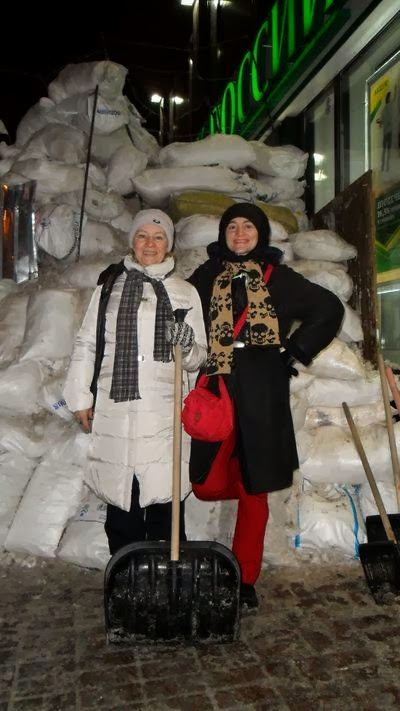My friend and colleague Olesya Ostrovska, an art expert in Kyiv, has graciously agreed to allow me to share this post, published last weekend, about current conditions at the National Art Museum of Ukraine, originally written as a post on Eurolution.doc Ukraine on Maidan, a Facebook page dedicated to sharing perspectives on current events in Ukraine "without cliche' or manipulations." I know the museum well, having often visited met with colleagues, observed school programs and presented workshops there. It's hard to believe, but as you can see in the photo above, the street protests are literally happening on the steps of the museum. (Photo via ЄвроМайдан – EuroMaydanon on Facebook).
Street
fighting keeps on continuing in Kyiv, Ukraine. Not long ago, we wrote about
“clashes of pro-Europe protesters with the police” but after the first
protesters died of gunshots and torture the “clashes” turned into an all-out
street war. The ‘battlefield’ is located meters away from the town’s prominent
European Square and within a five minute walking distance from the Independence
Sq. or “Maidan” – an epicenter of several month-long peaceful protests…
peaceful until recently. Street war is going on in a generally safe city, which
keeps on living its regular daily life. All is seemingly usual: people go to
work, but, in their offices, many of them collect money for medications and
warm socks for the protesters. People take rounds checking downtown pharmacies
for first-aid supplies requested by Maidan doctors (appeals are posted on the
Internet and passed along through social networks). Most pharmacies are short
on bandages and first-aid stuff – demand significantly exceeds supply.
Many
people keep on coming to their offices located right in the hotspot of the
street fights near that European square. One of places like this is the
National Art Museum of Ukraine , the largest and the most respected art museum
of the country. The riot police (Interior Troops of the Ministry of Interior of
Ukraine) took their positions right at the doorstep of the Museum: “Molotov
cocktails” hitting ground right next, stun grenades explosions - to which the
museum workers have already become quite used – and black smoke billowing from
burning car tire barricades hundred meters away… Maria Zadorojna, 38-year old
museum director, has stayed in the museum for seven days in a row, from the
first day of clashes when visitors had to be evacuated right through the
police’s defensive formation. She considers that leaving the museum even at
night is risky. Not because of her own safety. Because of the museum exhibits.
Although the museum is officially closed, many Zadorojna’s colleagues spend all
their time here as they are charged with keeping the museum exhibit collection
safe: unique medieval icons, Ukrainian baroque paintings, avant-garde art of
the early 20th century. Not later that a week ago, some masterpieces of the
collection could be seen in dark-green and red painted halls at the first floor
of the museum. The place was full of visitors and their kids attending museum’s
art classes…. Now the first-floor exhibition is evacuated.
During the first
days of confrontation, the entire museum staff, regardless of the positions and
despite the lack of invaluable in such conditions equipment, hours after hours
dismantled and transferred to safety the works of art trying to protect them
all. Now the halls are empty and prepared for any turn of events: one can see
fire extinguishers everywhere, windows are closed with protective shields to
prevent any damage from “Molotov cocktails” or stray bullets, the floor and the
windows are constantly cleaned of soot coming from burning barricades built of
used car tires. Museum workers consider the soot as a separate dangerous threat
as, when it settles on icons, it can seriously damage them. Yuliya Vaganova,
deputy Museum director, said that the riot police probably already know her and
her colleagues quite well, thus letting them pass through the police
checkpoints on the way to Museum pretty quickly. One can get around the
“battlefield” on the way to the Museum yet the police let people pass only if
they have museum worker’s identity cards on them. Therefore, some colleagues
have to stay in the Museum for their “night shift” while the others bring them
food and necessary supplies next morning. As of now, a temporary ceasefire
between the protesters and the riot police is announced at the European square.
The smoke is not so thick, the soot from the tire barricades is not so intense,
and, hopefully, the Museum will live through a quiet night. But an improvised
“field hospital” remains open. It’s been set up by protesters in nearby the
National Parliamentary Library of Ukraine, right across the street from the
Institute of Literature and Arts with its archives. Another night on an
unusually quiet frontline.
Translated by Andriy Zin









.jpg)
